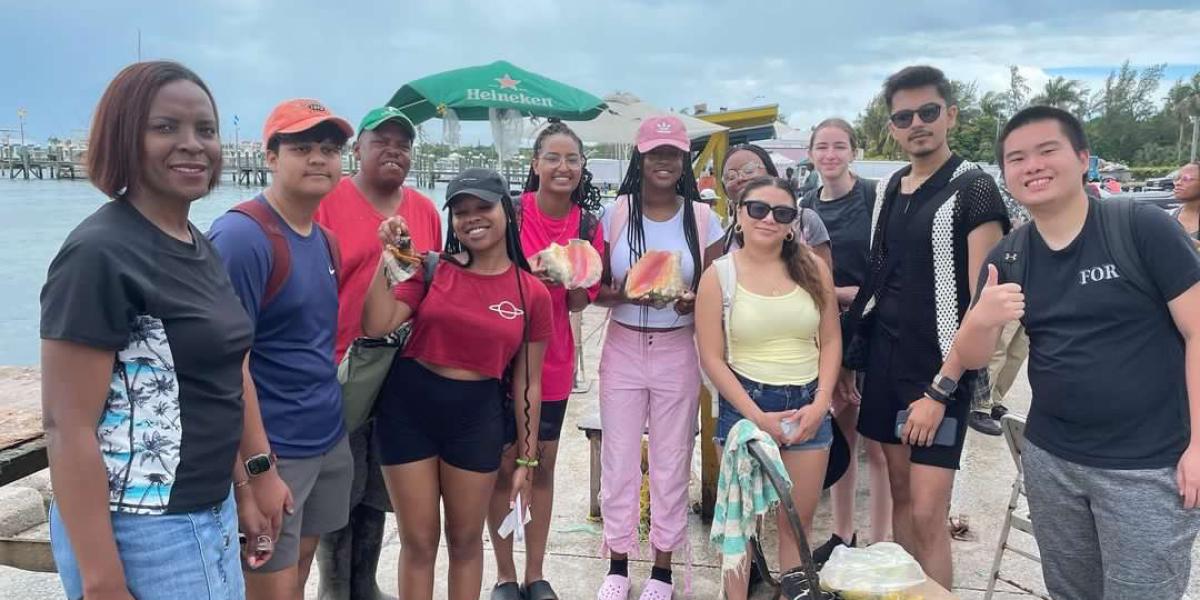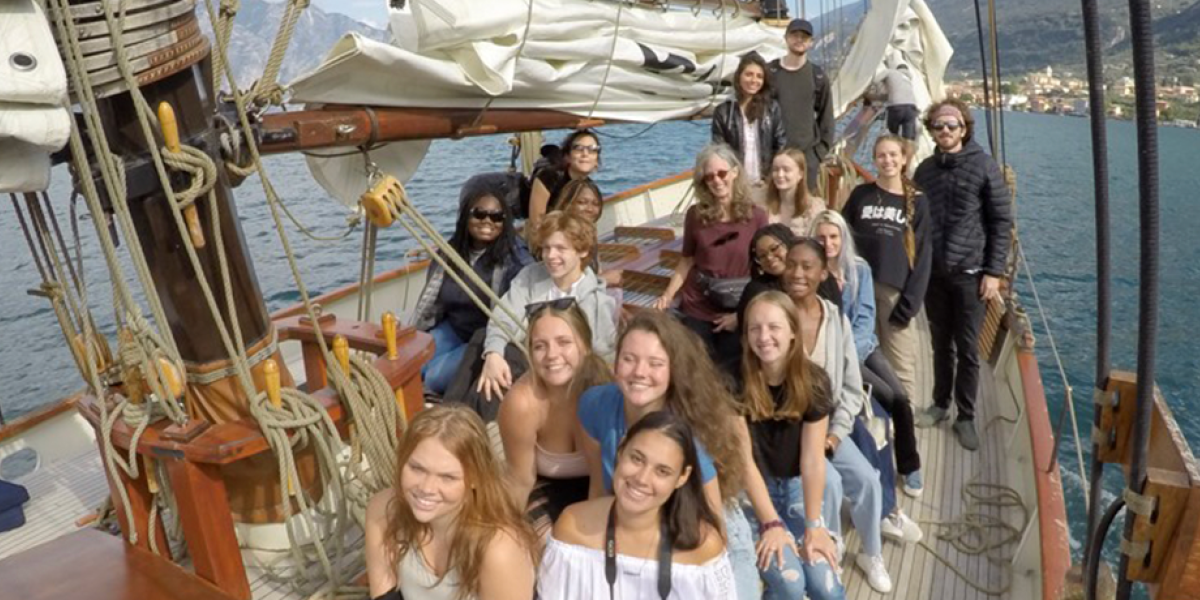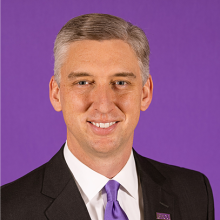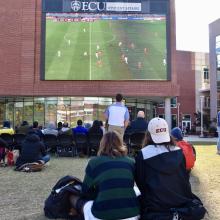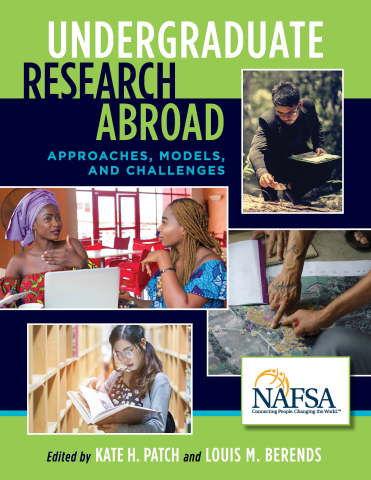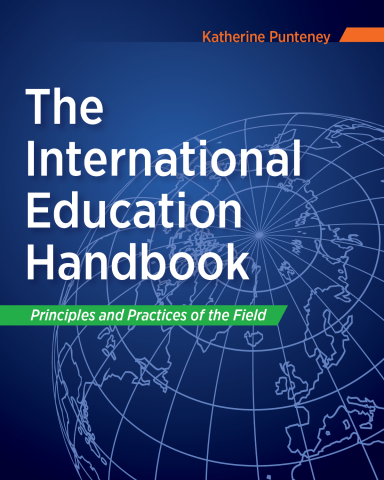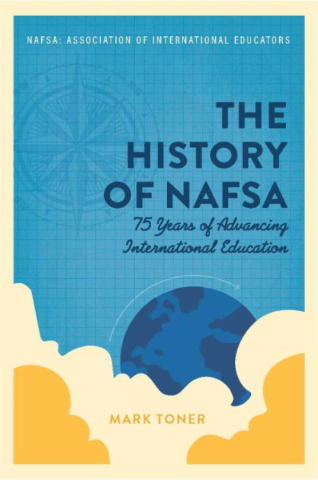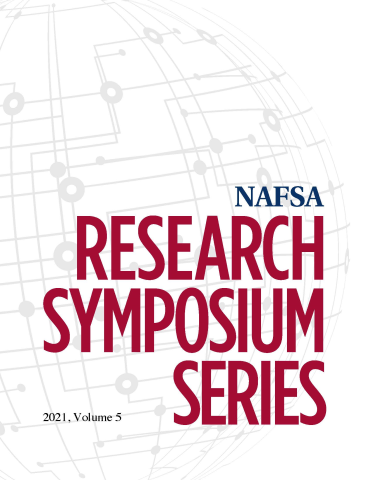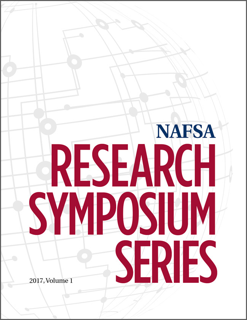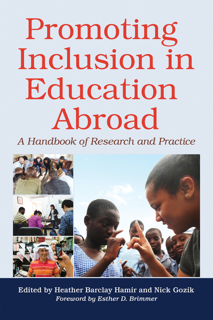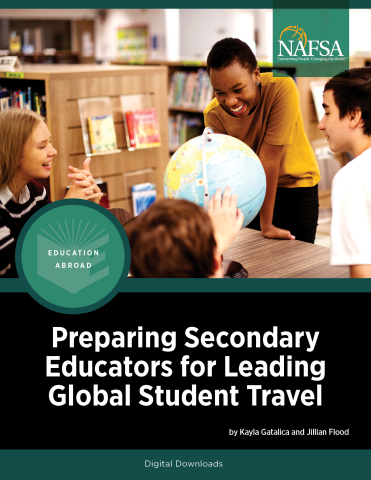2023 Comprehensive Georgia State University
Photo courtesy of GSU. Watch President Blake
accept the Simon Award on behalf of GSU.
Located in Atlanta, Georgia, Georgia State University (GSU) is a public research university with more than 54,000 total students and over 3,000 international students. Since 2010, GSU has embedded its commitment to internationalization in multiple strategic plans. The university has demonstrated its promise to increase access to global opportunities for all students through robust programming that includes a free passport program, virtual exchanges, support for immigrant and refugee students, and data-driven international partnerships. Around a third of GSU’s total students are enrolled at Perimeter College, which offers more than 30 associate’s degree pathways as part of the university system.
Georgia State University celebrated a significant milestone in 2021: more than 1,200 GSU students received their very first passports, through a new free passport program. Even though COVID-19 had halted most global travel in 2020, staff in the university’s Office of International Initiatives (OII) wanted to find a way to maintain interest in experiences abroad and lay the groundwork for a robust rebound in study abroad participation after the pandemic. The OII partnered with the passport offices on its Atlanta and Clarkston, GA, campuses to launch the initiative in February 2021.
As a result, the number and diversity of Georgia State students with a valid U.S. passport significantly increased. Of the 1,381 students who had received a passport through the initiative, 80 percent self-identified as non-White or racially underrepresented.
“We wanted to be able to provide passports for students who may not have even thought about going abroad,” says Provost Nicolle Parsons-Pollard. “We wanted students to be prepared to travel when the country opened back up. Just knowing that that part is already done is the thing that gets you to really think about what these experiences could look like and to realize that they're for you too.”
Part of the success of the program — which is ongoing — was the fact that it was strategically connected to the study abroad office. In order to receive a free passport, students must attend an in-person or virtual Study Abroad 101 workshop. “It’s not just giving them a free passport. The program is designed to connect students to our office so they have an introduction to who can help and how,” says Farrah Bernardino, senior director of the OII. “We give them the knowledge and tools they need to set them up for success in pursuing an international experience.”
Bernardino says that the passport program is just one of many ways that Georgia State makes international opportunities available to more of its students, in turn increasing representation and access to global education. GSU has sent more Black and African American students abroad than any other public higher education institution in the country. Perimeter College, which has been part of the GSU system since 2016, also boasts a study abroad part icipation rate that is three times the average for two-year institutions.
Photo courtesy of GSU.
“Georgia State has made a name for itself in terms of student success and access, particularly in terms of limiting the achievement gap for students who are typically under-represented in college. And we do that as well with global education,” Bernardino says. “We've developed all of our global education programs with access in mind. That includes international student enrollment and admissions, our plan for international partnerships, affordable education abroad, and having a diverse portfolio of global education programming so that students who cannot study abroad also have other ways to experience global education opportunities.”
One way that GSU has demonstrated its commitment to increasing this access is its mandatory international education fee charged to all students, which has helped fund $1 million annually in study abroad scholarships. Another example is a recent focus on virtual exchanges . Through annual funding competitions, the university incentivizes faculty who incorporate virtual exchanges in their coursework. A dedicated virtual exchange coordinator and two faculty fellows within the OII helped accelerate the adoption of virtual exchanges. As a result, the number of students participating in virtual exchanges increased from 105 in fall 2019 to more than 1,300 in fall 2022.
GSU has also extended its commitment to increasing access to its international student population by offering them the opportunity to apply for need-based out-of-state tuition waivers in their final semester. Since 2019, 134 international students have received these waivers, helping them to graduate. These students represent all degree levels and programs, including associate’s degree programs at Perimeter College. Additionally, many newly admitted undergraduate international students are offered need-based out-of-state tuition waivers to help eliminate cost-prohibitive hurdles to enrollment.
Perimeter College also hosts the Mentoring Initiative for New Americans at its campus in Clarkston, which is a major federal refugee resettlement site. The program provides mentoring support to refugee and immigrant young adults interested in pursuing a college education. It matches students with new Americans to provide them with academic and social support. The lower tuition at Perimeter College also provides a more affordable option for international students from traditionally underrepresented international student groups and countries.
Photo courtesy of GSU.
Breaking Down Silos
Achieving increased representation and access has been possible in part due to GSU’s senior international officer (SIO) reporting directly to the provost, which has helped break down the silos at a large, decentralized research university. “This spirit of collaboration and a common commitment to student success allowed us to collaborate across these silos,” says Wolfgang Schlör, the former SIO and associate provost of international initiatives who retired in March 2023.
The SIO oversees the International Council, a formal, university-wide committee that consults and collaborates on global initiatives. “Our International Council, made up of representatives appointed by the deans of all 13 colleges and schools, has been key for building effective communication and collaboration for global initiatives across the university,” Bernardino says.
Since it consolidated with the GSU system in 2016, Perimeter College has functioned as one of Georgia State’s 13 colleges and schools. The dean of Perimeter College created a new associate dean of international initiatives and dedicated two staff members to education abroad and virtual exchanges. Similar international leadership positions exist in other colleges around campus.
Lauri Goodling is the associate dean of international initiatives at Perimeter. She said her position has helped Perimeter boost its international engagement. “Because we consolidated with Georgia State, we also have a lot of advantages that other community colleges don't have,” she says . “We have the support system to help get our students abroad."
Assessing Global Competency
Georgia State’s focus on internationalization has grown over the last two decades. GSU’s 2010 strategic plan included “excellence in globalizing the university” as one of five strategic goals. Five years ago, the university built upon that goal to create a new strategic plan for the OII, which oversees education abroad, international partnerships, virtual exchange, and the Global Scholar Distinction initiative — a program that recognizes students who have taken five globally focused courses. The office also works closely with other units on campus, such as International Student and Scholar Services.
In 2019, the university adopted College to Career—a program focused on preparing students for the workforce—as its quality enhancement plan during the accreditation process. The plan included preparing students for the eight career-ready competencies identified by the National Association of Colleges and Employers. As a result, global programming content has been included in all freshman seminars at the university. “We were able to develop a module that was introduced in the freshman seminar that highlighted all of the different things students can do at Georgia State that strengthened their global and intercultural competency,” Schlör says.
The strategic focus on global competency has also informed the way in which Georgia State engages with partners abroad. Previously, the university had identified five countries to focus on for international outreach. That strategy provided mixed results, with political and economic developments in some countries making partnerships difficult to implement. Consequently, GSU switched to assessing existing partnerships based on criteria such as duration, multicollege engagement, and the types of activities involved. An international relations management system called PantherGLOBAL helps the university track all the different ways in which GSU faculty and programs are engaging in spe cific countries and regions of the world.
Kike Ehigiator, director of international partnerships and agreements, says that GSU uses the data it collects to assess whether particular programs and partnerships are successful. And success, she says, is often defined by how well those outcomes align with the university’s strategic goals.
In April 2023, Georgia State adopted a new strategic plan that will govern the next 10 years. Whereas internationalization was its own pillar in the previous strategic plan, it’s now integrated across the new plan’s four pillars: identity, placemaking, and belonging; innovating research, scholarship, and creative activity; student success 2.0; and beyond college to career. “We've evolved to a new stage where we see global as a key piece of the four strategic goals of our plan,” Bernardino says. “It's woven throughout.”

